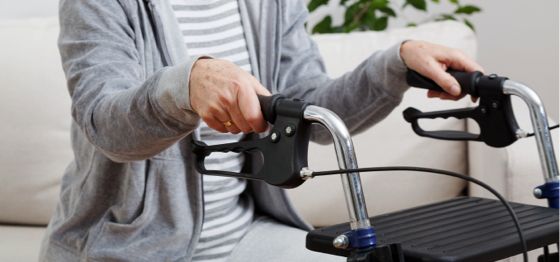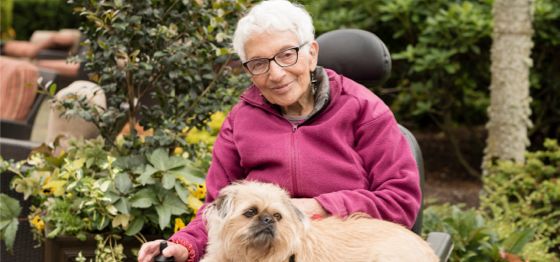Gradual changes associated with the aging process may begin to impact day-to-day life, including the ability to do household chores and run errands. Proactive evaluations such as senior living assessments may provide insights and propose solutions that allow older adults to preserve their independence and quality of life.1
What is a senior living assessment?
A senior living assessment is a thorough, in-person evaluation of an older adult’s mental, physical and environmental condition. Often conducted by a nurse or staff member of a residential facility, a senior needs assessment determines the current care needs and recommends appropriate living arrangements.2
Many senior living communities provide multiple levels of care, which is the reason a senior living assessment is designed to determine the level of care that will support the most active and engaged lifestyle possible.3
A typical assessment will evaluate behaviors, chronic illnesses, communication abilities, dietary requirements, ability to perform activities of daily living and manage medications and need for assistive devices. Often, family members and/or caregivers will be asked to be present to provide additional information and objective insight.4
Topics of discussion will likely include:5
- Special supportive services like oxygen or other needs requiring extra staff assistance.
- Mobility including use of a cane, walker, wheelchair or scooter, as well as fall history and risk.
- Will housekeeping services be required?
- Any memory, mental or confusion challenges?
- Will transportation be required, i.e., if a senior does not drive or cannot use public transportation.
- Medical needs including health issues and conditions, monitoring requirements and medicine administration.
- Need for bathroom assistance.
How to assess when an older adult needs caregiving assistance
Some signs that a more supportive living environment may be required include:6
Changes to mobility. Try the up-and-go test: Mark a line 10 feet from a chair. Say “go” and stand up from the chair, walk at a normal pace to the marked line, then turn around, walk back to the chair and sit down. On average, people who take 12 seconds or more to complete the up-and-go test are at a high risk of falling. Changes in gait may be indicative as well. Older adults who shuffle or drag their feet, or who spread their feet far apart when they walk, may be having strength or balance challenges.
Depression, which may not look like sadness but rather a change in energy level, irritability or anger, loss of interest in activities that were previously enjoyable, and either sleeping and eating too much or too little.
Issues with managing money, like allowing unopened mail and unpaid bills to accumulate, or spending an unusual amount of money on charities.
Loss of the ability to drive. According to the American Automobile Association, seniors are outliving their ability to drive safely by an average of 7 to 10 years.
Loss of the ability or energy to do laundry, shower regularly, keep a living space clean or interact with others may be a red flag as well, along with trouble keeping track of medication that include drug interactions and remembering to take medicine on time.
When any of these concerns are present, an assessment may be the next step. In addition to the staff at senior living facilities, there are other professionals trained to make an in-depth senior needs assessment. For example, a primary care physician, a neurologist to assess cognitive issues or a geriatric care manager may be called upon to offer recommendations.7
Senior housing options
For seniors who determine that they need a more supportive living environment, there are a number of options.8
Aging in place. Some seniors may be able to stay in their own home, taking advantage of tools like reverse mortgages, home equity loans or lines of credit, and hiring supportive and/or specifically skilled in-home caregivers.
Villages are grassroots organizations that coordinate to deliver programs and services to members so they can stay at home as they grow older and can be an alternative to a retirement community or assisted living facility.
Cohousing is a type of collaborative housing in which private residences may face each other across a path or courtyard. Cohousing communities often have shared amenities such as a pool, clubhouse, garden, kitchen or dining facility. The residents manage and maintain the property and may share common meals as well as helping each other with daily tasks such as shopping.
A continuing care retirement community (CCRC) offers all levels of care at 1 location, so residents can live as independently as possible even if their care needs change. A CCRC will often offer independent living in apartments or single-family homes on-site, as well as an assisted living unit and even a skilled nursing or rehabilitation facility, all on the same campus.
For those who determine that an assisted living facility is the right choice, the American Association of Retired Persons (AARP) has a checklist of important questions to consider when evaluating the options, including:9
- What are all associated costs, including entrance fees, security deposits, etc.? What services, health care services, utilities, etc. are included in those costs? Are other services available for an additional cost?
- How many living units does the facility have, and are there different sizes and types of units available? Are rooms and bathrooms private? Do they have handrails and call buttons?
- Are there kitchen or kitchenette facilities? If meals are served, when? Where? How often? 7 days a week?
- Are there common areas and/or special services available (bank, café, salon, linen/laundry service, etc.)?
- Can residents have their own cars? Is parking provided or is there a parking fee? Are other transportation options available?
- Can residents choose their own doctors, therapists and pharmacies? Can residents and visitors come and go at will?
- Are pets allowed? What about personal furniture?
It may be beneficial to conduct senior living assessments periodically, as needs change, to ensure older adults have access to all the care and support they need to safely remain independent.10
Go365 by Humana® makes wellness fun and easy. We help Humana Medicare members with Go365® on their plan reach health goals as well as take care of their physical and emotional health—allowing members to thrive at any age.
Humana Medicare members with Go365 on their plan can enroll in Go365 at
Go365 is a well-being and rewards program for many Humana Medicare Advantage members. Rewards have no cash value and can only be redeemed in the Go365 Mall. Rewards must be earned and redeemed within the same plan year. Any rewards not redeemed by December 31st will be forfeited.
To learn more about Humana Medicare Advantage, call to speak with a licensed Humana sales agent at 1-844-321-5843 (TTY:711), Monday – Friday, 8 a.m. – 8 p.m. local time or visit
If you need to enroll in Medicare Advantage or change your plan outside of the usual Medicare enrollment periods, a Special Election Period (SEP) could be the answer. For information on eligibility, visit Humana’s
Sources:
1Barbara Stepko, “How to Assess When an Older Adult Requires Caregiving Assistance,” AARP, last accessed October 18, 2022.
2“Understanding Senior Living Assessments,” Where You Live Matters, last accessed October 18, 2022.
3“Understanding Senior Living Assessments.”
4“Understanding Senior Living Assessments.”
5“Understanding Senior Living Assessments.”
6Stepko, “How to Assess When an Older Adult Requires Caregiving Assistance.”
7Stepko, “How to Assess When an Older Adult Requires Caregiving Assistance.”
8“Senior Housing Options,” National Council on Aging, last accessed October 18, 2022.
9“Assisted Living Checklist: Asking the Right Questions,” AARP, last accessed October 18, 2022.
10“Understanding Senior Living Assessments.”
Go365 is not an insurance product and is not available with all Humana health plans. This is a general description of services which are subject to change. Product features may vary by client. Please refer to Customer Support for more information.
Humana is a Medicare Advantage HMO, PPO and PFFS organization and a stand-alone prescription drug plan with a Medicare contract. Humana is also a Coordinated Care plan with a Medicare contract and a contract with the state Medicaid program. Enrollment in any Humana plan depends on contract renewal.




